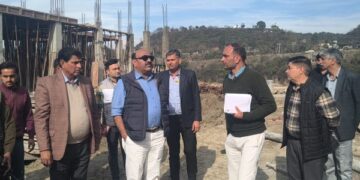JAMMU: J&K Judicial Academy in collaboration with WWF-India, organized a two-day orientation programme on “Wildlife and Forest Conservation Laws” for Judicial Officers and officers of J&K Forest Department from across the Jammu Province at J&K Judicial Academy, Janipur, Jammu.
The orientation programme was e-inaugurated by Chief Justice, High Court of J&K and Ladakh, N Kotiswar Singh, in the presence of Justice Madan B Lokur, Judge, Supreme Court of Fiji, Former Judge, Supreme Court of India along with Justice Sanjeev Kumar, Chairman, Governing Committee for J&K Judicial Academy and Roshan Jaggi, Principle Chief Conservator of Forest and HoFF, Chairman, J&K Biodiversity Council, Government of J&K.
Dr Saket Badola, CCF, Uttarakhand, Dr. M.K. Kumar, Chief Conservator of Forest, Jammu East, Moulika Arabhi, Advisor, Centre for Environmental Law, WWF India, Dr. Amit Dubey, Head-Wetlands, WWF India, Tejas Singh Kapoor, Centre for Environmental Law, WWF India and Rohit Rattan, WWF India was also present during the inaugural session who were the resource persons in the orientation programme.
The Chief Justice, in his inaugural address, highlighted that environmental degradation is mostly a result of human activities such as deforestation, vehicular pollution and industrialization which has led to environmental pollution and loss of biodiversity.
In his special address, Justice Sanjeev Kumar emphasised that our connection with nature is as old as our civilization. India has a rich ancient tradition of protecting the environment which in turn, has made the people of India worship and embrace nature in every way possible. He stated that the principle of sustainable development is to meet the needs of the present without compromising the ability of future generations to meet their own needs.
Roshan Jaggi, Principal Chief Conservator of Forests & Chairman of Biodiversity Council, in his keynote address, shared details of actions being taken by the J&K Forest Department to enhance forest cover, conserve water resources and protect wildlife.
Moulika Arabhi, Advisor, Centre for Environmental Law, WWF India, gave an introduction to the orientation programme. She said that there is a need for dedicated environmental courts adding that environmental laws are the body of laws, which is a system of complex and interlocking statutes, common law, treaties, conventions, regulations and policies which seek to protect the natural environment which may be affected, impacted or endangered by human activities. She said that every state should have a cordial relationship between the judiciary and the Forest department for the effective implementation of better environmental well-being.
Y.P. Bourney, Director, J&K Judicial Academy, gave an overview of the programme, saying that India has always had a rich ancient tradition of protecting the environment which in turn, has made the people of India worship and embrace nature in every way possible. Trees, water, animals, and land have an important mention in ancient Indian texts. Hymns in the four Vedas, reveal full consciousness of the undesirable effects of climate change, distortion in ecological balance, and environmental degradation and appropriately caution against them.







